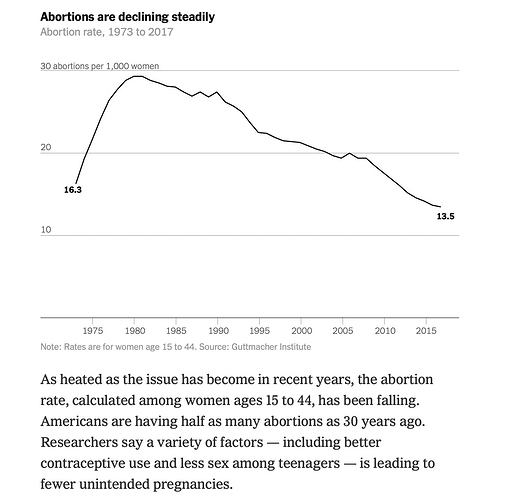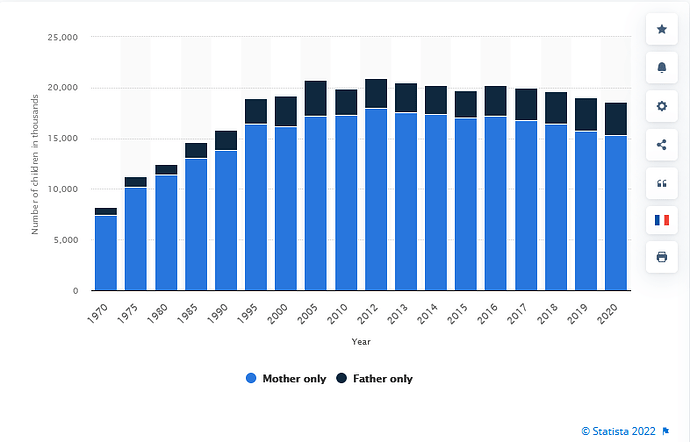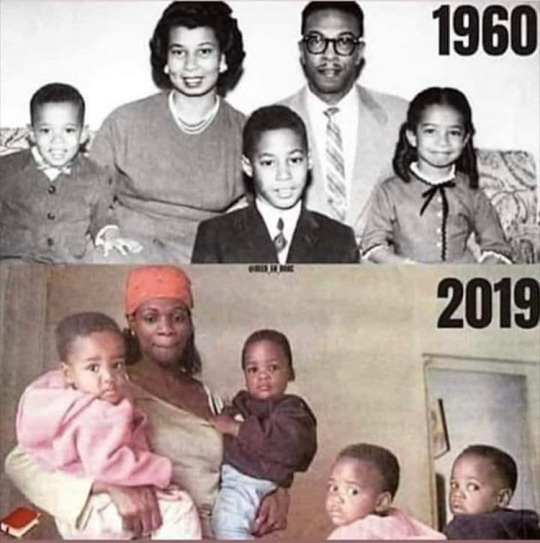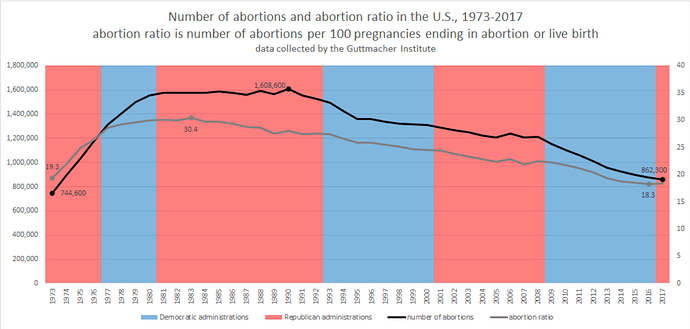Exactly. Multitude of domains, topics and issues we can surface across.
Agreed, there are any number of factors that could be contributing to this, including the rural/urban divide (though it’s worth noting that blue states have large swaths of rural communities as well), or possible systemic issues. Hell, it could be the climate for all I know.
That said, the fact that America is 33 out of 36 is not a very good look.
Another diagram I just found while looking for data — that the urgency people feel around banning abortion seems to have an inverse correlation with the number of abortions that are actually occurring in the real world. Which is further evidence, I believe, that the current Roe status quo continues to be the best possible compromise at this time, as this trend shows that abortion is continuing to become increasingly rare.
Good point. Lawanna and I had drifted I to women’s right to vote sidebar.
Now instead of abortion you want to castigate the US on an adjacent concern.
One thing we look at in statistics are mean, standard deviation. Rank order is almost useless in decision making but being ranked 36th does sound horrific. How far off is 36th from 20th from 1st? And what would be the absolute lowest mortality rate possible?
Interestingly I does look like babies fare by far best in Western cultures, at least for now.
Japan and US are the only +100M pop countries in the list, until Mexico babies fall off a cliff.
And what’s not included in the infant mortality rates?
What if we looked at abortion restrictions as Internal Quadrant development legislation?
Something along the lines of really considering beyond self, transcend self to live consciously?
Perhaps something along the lines of mandating percieved microagressions or interior quadrant Racism.
Some more data about infant mortality:
Background
Infant mortality rates (IMRs) are disproportionally high in the U.S. South; however, the proximate contributors that could inform regional action remain unclear.
This caught my eye, but it’s 40 year old data, and I imagine things have shifted significantly since then.
An epidemiologic evaluation of regional IMR differences in 1980 found that 72% of excess infant mortality in the South was due to the greater proportion of black births, reflecting a persistent racial disparity.
According to some Associated Press studies and 2019 data from US Census Bureau and the Centers for Disease Control, Mississippi also has the nation’s largest share of children living in poverty, and babies born with low birth weight. Louisiana and Texas fill out that top three.
Texas has the highest rate of women receiving no prenatal care during the first trimester of pregnancy, with Mississippi and Indiana filling out the top three. Texas also ranks second worst for proportion of children in poverty who are uninsured.
While there may be other factors for the infant mortality rates, poverty is definitely a contributing factor to both seeking abortion, and also having unhealthy pregnancies and children.
I am not sure what exactly this means. Can you give me other examples of “internal quadrant development legislation” in this country? As far as I know, we create legislation that restricts behaviors, not thoughts or feelings or intentions.
I guess my overall question is…
a) if abortion rates are already going down steadily year after year,
b) if post-viability abortions are already exceedingly rare, and the vast majority of those are for medical emergencies,
c) therefore the legal restrictions proposed by conservatives don’t actually make any meaningful impact whatsoever in the actual rate of abortions (as you seemed to concede several comments back),
d) and if we are capable of doing all this WITHOUT the state legislating away women’s bodily autonomy,
…then what exactly are we doing? What are we fixing? Are we just explicitly restricting women’s liberty, and creating piles of paperwork and bureaucratic meddling in people’s private affairs, with no net gain other than the “good feeling” that some of us might see our morals and metaphysics encoded into law?
Also worth noting that to this day, black women die during childbirth at a considerably higher rate than other ethnicities. Why might this be? Another question that may be ripe for some Zone analysis.
-
Some blame this on explicit Zone 2 racism — doctors and nurses consciously or unconsciously treating certain patients differently than others.
-
There do not appear to be any biological factors in Zones 5/6 that would contribute to this.
-
Some point to unexamined shared stereotypes in Zone 4 — namely the idea that black people can simultaneously tolerate more pain, but are also the quickest to complain about pain (a common ethnic stereotype, actually, that the ‘other’ is “simultaneously strong and weak”), which many nurses claim to have experienced on the floor,
-
Some point to systemic issues in Zones 7/8, primarily poverty and its impact on nutrition, access to quality healthcare, exposure to environmental pollution, etc.
-
Others point to Zone 8 environmental factors — urban versus rural population densities, etc.
Yet another wicked problem…
Great article Ray. I was struck by the similarities between now and the mid-19th century around abortion and contraception, as there was back then, according to the article, also concern with low fertility rates (particularly among upper class white women), immigration, and the trope that the white race was being replaced.
Now instead of abortion you want to castigate the US on an adjacent concern.
Castigate? No. Have a sober and realistic understanding of our social challenges, without sweeping them under the rug of “America is best at everything!”? Yes 
It’s important for us to have a realistic understanding of the problems we face as a nation, and how we might go about solving those problems. None of it takes away from the positive qualities of America, as you see them, or from my sense of national patriotism. Hell, it’s my patriotism — namely, my care for all citizens that are members of this particular system — that makes me want to fix the problems in the first place. Plus the whole “wanting to leave a better world for my children” thing.
One thing we look at in statistics are mean, standard deviation. Rank order is almost useless in decision making but being ranked 36th does sound horrific. How far off is 36th from 20th from 1st? And what would be the absolute lowest mortality rate possible?
That’s all included in the link I shared. Mississippi, for example, is 2.3 times greater than the OECD average, and 4.5 times higher than the lowest mortality rate recorded.
Japan and US are the only +100M pop countries in the list
And yet, look at the difference between them — 1st out of 36, versus 33rd out of 36. Very different geographies, population densities, and wealth inequalities though!
Can we agree that we may have some serious systemic work to be done here? It seems to me that, if protecting babies was our ultimate goal, this would be a great place to focus our efforts, and can probably be accomplished without betraying 70% of the country’s wishes and triggering a new Civil War 
If we added Abortions, conscious infanticide to the numbers you’ve listed, what would it do to the rate per 1000?
Lawanna and I had this discussion a while back so I know the number, but best you look it up yourself so it’s it’s bit more meaningful.
Then ask me what we should do to decrease infant mortality.
A fetus isn’t an infant.
what would it do to the rate per 1000?
Are we talking about post-viability abortions, the vast majority of which are done for medical emergency (including miscarriage and threat to mother’s life), which you’ve already agreed should be the cutoff?
I mean, it’ll shift the numbers a bit, but you’d also have a lot of motherless babies…
Yes, a complex problem. Probably all of the points you mentioned are on the causatives list to one degree or another. There are a couple of things I notice from Pew Research on the black population in the US, conducted in 2019, published in 2021, that may be relevant. (The “black population” is based on people self-identifying as black, which includes 3 categories: single-race non-Hispanic black, multiracial non-Hispanic black, and black Hispanic—96% speak English, while some also or solely speak Spanish, French or Haitian Creole, or an Ethiopian language):
*The black population has grown by 29% since 2000 (46.8 million now, 36.2 million then) This relates to possibly both conscious and unconscious ‘white-threat’ and possibly an attendant conscious and unconscious racism.
*10% of the black population were foreign-born in 2019, compared to 7% in 2000. Same comment as above, but also considerations as to language barriers, and cultural competency in terms of accessing resources, and also cultural knowledge/views about self-care/reproduction, etc. I don’t think we have a breakdown of black women dying during childbirth according to native or foreign-born.
*56% of the black population live in southern states (Texas, Florida, Georgia, the top three respectively) There is an undeniable history of hang-over racism being more prevalent in the south. Plus, many of the southern states have the highest poverty rates, which affect whites as well, of course.
*44% of the black population has an educational attainment of high school or less. (33% some college, 23% Bachelor’s degree or more)
*The US black population is young, with a median age of 32, compared with age 38 for the population as a whole. A third of the US black population is age 22 or younger. Again, issues re: self-care/responsibility, knowledge/responsibility re: reproductive and pregnancy issues. So maybe some Zone 6 behavioral issues.
I was considering that perhaps a multi-zone, mutli-quadrant analysis into choosing to and having an abortion might be helpful - not the anti anti stance, not an opposition analysis. I think we’ve hammered away enough at “those people” that oppose abortion, but what goes on within, without, individually, cross culturally for those that do choose and then have an abortion? I think there is a lot more to below the surface.
I’m sure all of the positive arguments would map well into a multi-zonal perspectives.
Excellent question. I guess you’d want to understand why a seemingly majority of the 150M voters want or are ok with restrictions - and maybe they aren’t and the next several elections will change things, again. I’ve tried to share my moderately informed, moderately deliberated view, but I’m just 1 of 75M.
I’m trying to shift out of this surface level us vs them ideological debate, which I think we can all get juiced up over but likely aren’t really understanding what goes on with the potential birthing person, impacts upon society,… Trying to get us above the fray so to speak.
What do you think is Root Cause?
From what I’m hearing here on IL, Systemic Racism might be slightly better (or might be even more insidious) today than in 1940, but it’s definitely a serious issue.
Here are all single family households by year. Note that the numbers in in thousands, so 20,000 on the graph is 20,000x1,000 or 20 Million.
Is it a cause/effect relationship with social benefits expansion (Thomas Sowell’s is quite adamant on this point - drop out, Marxist, eventual Economics PhD and conservative intellectual) or simply correlated?
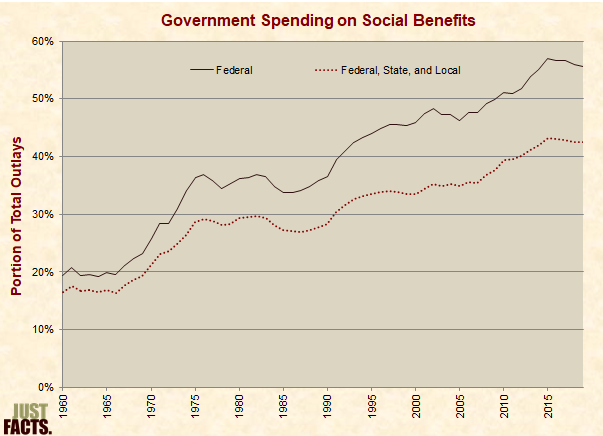
And the emotive graphic…
Abortions per Year
What is the cause and what is the effect?
Is he saying raising social benefits causes more people to become single parents or more single parents causes a rise in social benefits?
The first sounds absurd (conservative?) while the second sounds like compassion (liberal).
It also looks like an increase in social benefits correlates to decrease in abortions over time from 1980 to present.
Good morning!
I am not sure what you are referring to with your question “what do you think is Root Cause?” Of abortion? Or black mothers dying in childbirth at higher rates than other ethnicities? I doubt there is a single ‘root cause’ for either.
I did want to make a couple of comments about that photo of the black mother and children in 2019.
What I did not cite from the Pew Research in my prior post are statistics on black households in 2019. According to that research, a plurality of blacks (38%) live in family households with a married couple. 32% live in households headed by a female, and 6% in households headed by a male. 24% of blacks live in “non-family households” (e.g. college dorms, institutions, military barracks, other group quarters). So that 2019 photo is not representative of the plurality of black households. And maybe the 1960 one is not representative either; I don’t know.
Also, and I emphasize this is pure wondering, pure speculation on my part, but I wonder if some of the black maternal death during childbirth could be due to ‘death by despair.’ Consider a woman who is black, perhaps poor, perhaps young and uneducated and alone, perhaps ill-nourished or in less than good health, who perhaps already has children she can’t adequately financially or otherwise care for and is stressed and despaired to the max, and who is having a complicated, difficult delivery—is it possible she might in some way just choose to let go?
Pure speculation, wondering on my part. I do not know all the descriptive aspects or demographics of those black mothers dying in childbirth. (Edit: I’m sure some of the things I cited above have been accounted for in the comparative studies of black maternal childbirth deaths with other ethnicities, but I’m not sure those studies cover it all.)
We do know however that there is death by “broken heart syndrome” in which physical and/or emotional stress and loss can cause a heart problem and lead to death (rare: fewer than 200,000 cases a year in the US, usually in people over age 50). Maybe there is a “broken spirit syndrome” too, that can cause certain problems that lead to death, where there is just inadequate will to live and that manifests through a physical problem that causes bodily death. Despair is recognized as correlated with suicide; I just wonder about despair and its relationship to other kinds of deaths.
I absolutely agree LaWanna. Stress causes cortisol production increase many of the common killer - heart attacks, strokes, obesity, inflammation, and more. Not only is it a killer but it dampens vitality and overall well being. So absolutely you can die of despair or broken heart.
If you haven’t already I highly recommend the Furedi interview.
We had slid into infant mortality some, but root causes likely contribute to many of the disparities we see.
Some more zone 4/2 data about how black Americans are often treated within the medical system:
Here’s what Louisiana Senator Bill Cassidy had to say about maternal death rates in his state:
“About a third of our population is African American; African Americans have a higher incidence of maternal mortality. So, if you correct our population for race, we’re not as much of an outlier as it’d otherwise appear. Now, I say that not to minimize the issue but to focus the issue as to where it would be. For whatever reason, people of color have a higher incidence of maternal mortality.”
I don’t know about you, but “we are actually not too bad, if we don’t count all the black people” doesn’t seem like a very good argument.
Plus the whole “I don’t want to minimize” line, followed immediately by “for whatever reason” comes off as a total disregard and dismissal of the probable systemic causes for increased maternal deaths among black women.
I think this is actually a really great (but heartbreaking) issue to explore “systemic racism” through, because the facts are pretty cut and dry and well documented, because we know there are zero biological reasons why this should be the case, and because we don’t need to rehash left vs. right squabbles around adjacent issues such as black culture, fatherlessness, etc. There is nothing about black women’s bodies that should make them more likely to die during childbirth, and there is nothing about black culture that should make them more likely to die during childbirth. This is one area where we should absolutely expect “equal outcomes” — there is no reason maternal death rates should be any higher among one ethnicity than another, unless those groups are being treated differently by a given system.
Which basically only leaves us with systemic causes (which would include economic factors, access to healthcare, access to nutrition, etc., as well as implicit Zone 2/4 bias within these different systems), environmental causes, and other surrounding bigotries. And if we can admit that some degree of “systemic racism” exists here, maybe we can admit it exists in other sectors, even if it’s not quite as pronounced or primary as some wokists insist it is?
Couple of statistics that might help in your polishing up your proof.
Black’s are getting much more than equitable Abortions.
https://www.kff.org/womens-health-policy/state-indicator/abortions-by-race/?currentTimeframe=0&sortModel={“colId”:“Location”,“sort”:“asc”}
Meanwhile Whites are clearly getting privelaged access to Opiods.
Maybe the Black Abortion advantage makes up for the Whites opiod advantage?
